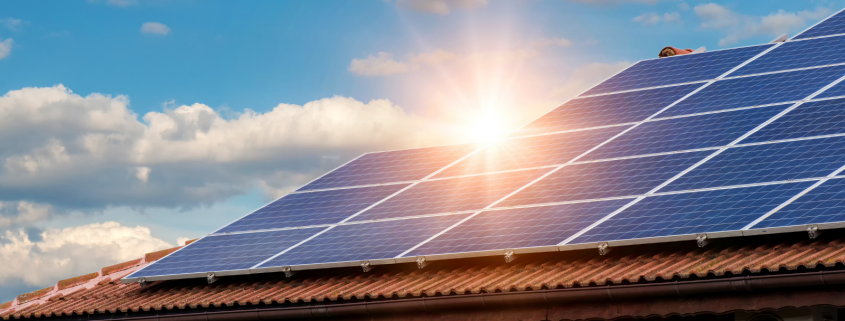What’s the best time of year to get solar panels installed?
As one of the sunniest places on earth, it comes at no surprise that Australia has the highest solar uptake in the world. In 2021, one in four Australian homes had a solar system installed on the property; and in 2020, over a quarter of our electricity was generated from renewable sources. With the prices of solar systems dropping dramatically, the number of Australian families and businesses signing up for solar continues to increase every single day.
If you’ve been thinking about making the switch to solar, there’s no better time than the present. In fact, spring happens to be one of the best times of year to have solar panels installed on your property. So, if you’re looking for something to spend your tax return on, solar would be a great choice. Find out why in this article.
When is the best time to have solar panels installed?
The Australian continent has the highest level of solar radiation per square metre in the world, which means that many of our cities are goldmines for harvesting solar energy.
We’ve written an entire article explaining how solar systems work, but for those who just want to know the basics, it’s actually pretty simple to understand. Solar systems work by converting energy from the sun into electricity, via an inverter. The inverter converts DC energy into AC energy, making the power harvested from the sun suitable for use inside the home. Whenever the sun shines, solar cells are able to harness this energy in order to generate electricity.
Since solar relies on sunlight, it makes sense that spring and summer are two of the best times of year for solar energy production. Longer days mean more hours of sunlight, and more hours of sunlight mean that solar panels have more time to soak up the sun’s rays.
Installing a solar panel during spring means that you have an opportunity to start harvesting energy straight away. Air conditioning bills can quickly add up, so having a solar system installed before the start of summer means that you can start saving big on your electricity bills come December and January.
Do solar panels work better in summer or winter?
Solar panels work best when the sun is shining, it’s as simple as that! In regions where the days are longer and the skies are clearer during the warmer months, summertime is an optimal time for solar energy production.
This isn’t to say that solar panels are useless during winter. Contrary to popular belief, solar panels rely on light, not heat, in order to generate power. That means that the actual temperature doesn’t have an affect on a solar system’s ability to generate electricity.
The reason why summer is seen as the ‘best’ time of year for solar simply comes down to the fact that in most places, there are more hours of sunlight during these months. However, if you’re lucky enough to live in a place where it’s sunny and bright all year round (looking at you, Queensland folks!), these seasonal changes often don’t have a significant impact on solar output.
How much more energy do solar panels produce in summer?
The energy production of a solar system depends on a variety of factors, including how much sunlight it receives, how clear the sky is, and the angle at which the sunlight is hitting the panels. All of these factors just happen to come together in summer, during which the days are longer and the skies are clearer. That’s why in many regions, solar panels will produce more energy during summer than in winter.
There will inevitably be some variation in your solar system’s energy production throughout the year; however, since panels depend on sunlight (not heat) to convert energy, some regions aren’t as greatly affected by these seasonal changes.
The closer to the equator you are, the more solar radiation you receive throughout the year, so if you’re in northern Australia you might be lucky enough to receive lots of sunlight all year round. Interestingly, in Darwin, the average performance of solar panels actually improves in winter due to the cooler and clearer days. It just goes to show that the energy production of solar panels is highly dependent on the local climate of your region. If you’re unsure about the suitability of your home for solar, it’s a good idea to seek advice from your local energy expert.
What is the best month for solar?
It’s difficult to define the ‘best’ month for solar. How well a solar system performs depends on a variety of factors. In most places in Australia, the most productive months for solar energy production would be the spring and summer months, where there’s less rainfall and more direct sunlight. Solar panel performance can drop anywhere between 2% to 15% during the winter months in Australia.
However, in places like Darwin, where there’s a clearly defined wet season, winter is actually a better time for solar energy production than summer. This is because the winters in Darwin are marked by less rainfall and fewer clouds. With that being said, when installed correctly, solar can be a highly efficient form of energy all year around. Where there’s sun, there’s a way.
How many hours of sunlight does a solar panel need?
The amount of energy in sunlight that a solar system takes in over the course of 24 hours is expressed in ‘peak sunlight hours’. On average, most Australian cities have around 7 peak sunlight hours during the spring and summer months. However, any place that receives at least 4 hours of sunlight a day is considered to be a good location for solar.
Do solar panels make your house hotter?
Solar panels will not make your house hotter. In fact, solar systems actually do the opposite. Rooftop solar panels have insulating properties, which means that they help to keep your house cool. The panels act as shades by preventing direct sunlight from hitting your roof. This, in turn, prevents unwanted heat from entering your house.
A research team at UC San Diego Jacobs School of Engineering carried out a study on the cooling benefits of rooftop solar panels and found that efficient solar panels can reduce the amount of heat hitting a rooftop by about 38%! Although solar panels can’t be relied upon as an effective insulator, their insulating properties are an added bonus.
The future of solar in Australia is brighter than ever, so now is the perfect time to make the switch to solar. At Jim’s Energy, we provide our customers with high-quality advice, high-quality products, and high-quality service. If you’re curious to learn more about installing solar on your property, don’t hesitate to get in touch today. Give us a call on 131 546 or contact us online to receive an obligation-free quote.
Related Jim’s Group News
– Tips to Reduce Your Household Power Bill and Make Your Home More Energy Efficient.
– 8 Tips for Keeping Your House Warm This Winter.
– How Much Money Can I Save With Solar Energy?
– A Beginner’s Guide to Solar Power in Australia.
– Everything You Need to Know About the Australian Government Solar Rebate.







